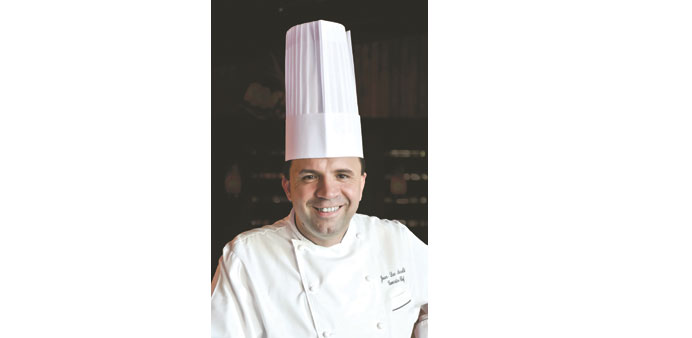By Anand Holla
Once the weather begins to mellow down in the coming weeks, Doha’s vibrant food scene will no doubt gain irresistibility with full force. At the forefront of such gourmet temptations will be a long line of tantalising delicacies in top hotels like The St. Regis Doha.
With 26 years of experience in the culinary world, Jean-Luc Morcellet, the Executive Chef of The St. Regis Doha, promises to present the finest of world cuisines.
Morcellet has worked on cruise liners, at London’s Dorchester and Dubai’s Grosvenor House, which he opened, apart from The Palace in downtown Dubai, Imba Matomba Lodge (Relais & Chateaux) in Zimbabwe, Appolo Ship Chandlers in Miami, and Le Meridien Montparnasse in Paris. Community caught up with the French chef for a quick chat:
Q. How different or challenging is it to work as an Executive Chef in Qatar, from all your previous postings at the UK, UAE, Zimbabwe and France?
A. The challenges in Qatar are very similar to everywhere that is to manage the delivery of individualised, perishable luxury goods and special ingredients; allowing us to separate ourselves from the others, whilst assuring the high quality of each of these varied products and maintaining their freshness.
Q. Why is it challenging?
A. In Qatar, the market for our suppliers is still very new and small, and sometimes because the product is unknown, the legislation makes the process for suppliers more difficult than it would at the other places that I have worked before. So, while the suppliers might be initially enthusiastic to try to deliver new products, issues may arise in the form of spoiled food, which would affect reputation and liability in the market place.
Q. In a time when global cuisine is increasingly becoming local, how do you plan to set the food at The St. Regis apart from others who specialise in various cuisines?
A. Working at The St. Regis as a very prestigious brand is all about being different, and focusing on quality and working out what people really want. In addition, delivering it at an exceptional standard of personalised service is the challenge, especially in a region not known for agriculture. I am still discovering what Qatar has to offer locally, but the quality of some of the products produced or processed within the region is very encouraging.
Q. What is your understanding of the food culture and dining scene in the Gulf, and more so in Qatar? Please elaborate.
A. Having spent 10 years in Dubai, I have seen the food culture become increasingly interesting, competitive and incredibly international. It’s about delivering the best cuisines at exceptionally high standards, due to the city’s expat community’s requirements. In Qatar, I am seeing a transition and a willingness to be adventurous. However, dining out is expensive, in comparison to other Gulf countries and this is a limiting factor.
Q. What are the three rules that you, as a chef, live by?
A. Never compromise on quality, never say no until all possibilities have been exhausted, and always look after my colleagues because if they are happy, then the guest is happy.
Q. Please share a memorable anecdote from your vast experience in the culinary field.
A. One of the most memorable experiences of my career was personally cooking and serving a meal for the ex-Prime Minister of South Africa, Nelson Mandela, while I was at the Dorchester on Park Lane in London, England. He ate at our private Chef’s Table in the kitchen and was very pleased with the lunch. He asked me to thank all the chefs present at the time in the kitchen. He shook hands with each and every member – about 35 chefs – who were present, to show his appreciation. Mandela truly was a great leader with an inspiring personality, who has set a simple example for the world to follow.

Chef Jean-Luc Morcellet.
